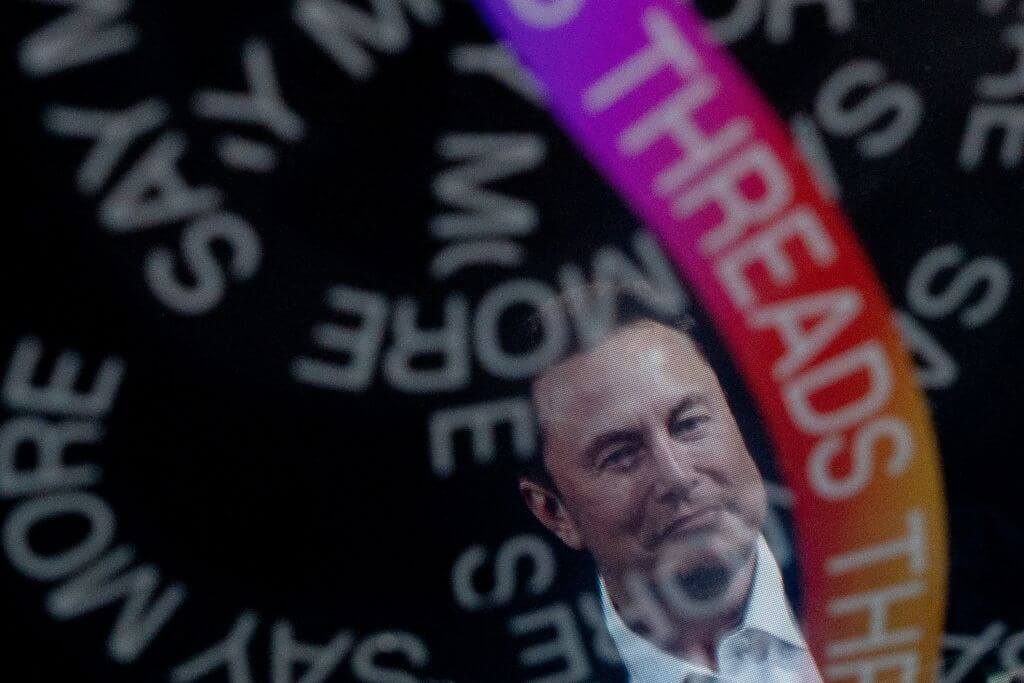There was a mass exodus to Threads. Is Jewish Twitter staying behind?
For all its flaws, Twitter still seems superior to its rivals when it comes to building community

Photo illustration of Twitter owner Elon Musk reflected in the opening page of Threads, an Instagram app. Photo by Stefani Reynolds/AFP via Getty Images
One Saturday night a few years ago, Rabbi Dovid Bashevkin tweeted a picture of the book he had been reading that day. The idea was simply to recommend it, but a few of his followers replied with their own Saturday reading material.
“I read this on Shabbos” caught fire as a meme, then a trend, and finally a feature of Jewish Twitter, the community that kibbitzes and kvetches about Jewish life in 280 characters or less. Some caption their posts in the non-Ashkenazi manner: “I read this on Shabbat,” not Shabbos. But to Bashevkin, this was Twitter at its best. The app wove a tapestry from many different Jewish threads.
“Twitter serves as this place where we can kind of pass notes across the mechitza,” Bashevkin, 38, said, referring to the physical barrier between men and women in some synagogues. “Normally in the Jewish world we have these boundaries — important boundaries — but it was a place where it was appropriate to interact with those from outside of your community and almost build friendships.”
Now Bashevkin and others who have built Jewish Twitter are testing Meta’s Threads.
Going Meta
They’ve got some of the same reasons everyone else has for hoping that Meta, the company that gave us Facebook and Instagram, has come up with a better alternative to Twitter. And some particularly Jewish ones too.
Under Elon Musk, who acquired Twitter in October 2022, Twitter has suffered numerous technical headaches, restored legions of banned accounts and seemed to promote known agitators. Antisemitism on Twitter has spiked. He fired the entire team of moderators who policed hate on the platform.
Fed up, some Jewish users quit Twitter weeks before Threads existed. More than 100 million users signed up in Threads’ first week, the company said.
But though bigotry and obnoxiousness may not be thriving the same way on Threads, Jewish users I spoke to are having a hard time finding a home there, at least one similar to the one they had on Twitter. Bashevkin was one of several Jewish Twitter personalities who said they would not be switching to Threads, even as they admitted Twitter had changed for the worse.
The site could be toxic, spam-filled and a drain on mental health, but they believed the future of Jewish Twitter was, well, on Twitter.

Trying Threads
Bahevkin, the director of education at NCSY (formerly known as the National Conference of Synagogue Youth), opened a Threads account shortly after its July 5 debut.
He did not last long there. After “threading” twice, he ditched the platform, describing himself as “philosophically opposed.” He has amassed 24,000 Twitter followers, and is prepared to go down with the ship. If it does ultimately sink (it struggles with heavy debt and ad revenue has nearly halved since Musk took over), Bashevkin said he would take a hiatus from social media.
Others continued threading in spite of their doubts about the new platform.
Avital Levene, who goes by the Jewish Meme Queen on Twitter, where she posts Jewish humor for about 9,000 followers, adopted a similar username on Threads and has been posting there a couple times a day.
So far, she said, it’s “a Twitter wannabe place,” lacking many of the features that facilitate community building on that app, like hashtags, direct messages and search.
Lack of Community
More importantly, she said, it’s missing many of the people she likes following on Jewish Twitter, especially like-minded Orthodox Jews. She noted that Threads made it easy to create an account through Instagram, but also observed that some Orthodox Jews, especially Orthodox men, don’t seem to engage much with Instagram and are therefore less likely to migrate.
“The majority of people on Twitter just do Twitter — that’s their entertainment, that’s their outlet and they stick with it,” Levene, 25, said. “They don’t have time for TikTok and Instagram and Facebook and the like.”
Since Musk took over at Twitter, Levene says she’s noticed an uptick in antisemitic troll accounts, and that many of the hateful comments she reports don’t get taken down. But overall, her experience on Twitter was still one of civility, at least in Jewish spaces. The community polices itself. People tend to shout down those who are cruel. And the trolls, she said, “you just have to block out.”
And in spite of Musk’s reluctance to crack down on even some of the most intolerant voices on the platform, tolerance prevails on Orthodox Twitter, Levene said, which she believed was the product of a more educated user base than Instagram’s — and a smaller one. She predicted that the dominant voice in the Orthodox corner of Threads would be more reactionary because that’s the tone she encounters on Orthodox Instagram.
“Instagram is just more toxic,” she said. “There are too many people who are close-minded on there. On Twitter, the liberal Jews really have more of a voice.”
The people remain the product
In a way, the advent of Twitter rivals — not just Threads, but also Bluesky and Mastodon — highlighted Twitter’s best features. Jewish Twitter users had made memories, connections and careers on the app — and whatever remained of those possibilities made Twitter worth enduring.
Emily Tamkin, a journalist and author of Bad Jews, noted that Musk’s decision to overhaul blue-check verification made the app harder to use. Other technical difficulties have throttled the site since Musk took over — sporadic outages, “rate limits” and an influx of spambots.
None of those headaches compared to a much older scourge: the nastiness its users often displayed toward each other. Tamkin said she thought Twitter’s architecture enabled that behavior.
And yet: On the same website she had turned many online friends into real-life ones, built a following of 20,000 and met her husband.
Not all Twitter’s fault
“While there were days that I was like, I’m so angry about this tweet, it’s also brought a lot into my life,” Tamkin said.
Reflecting on her marriage’s origin in a Twitter direct message about an article she had written — the correspondence eventually produced a coffee date — she said the first in-person interactions with her future husband worked because “there was a sense you already knew each other.”
Now she wondered if social media’s moment as a site of civil discourse had passed entirely. Twitter had swapped its meritocracy for a system that up-ranks anyone who pays $8 per month. And she didn’t see Meta caring about fostering any kind of discourse at all. One of the reasons Tamkin said she had not created a Threads account was that she feared its algorithms were more likely to surface brands and influencers than accounts you actually follow.
Meanwhile, most people I spoke to agreed that Twitter’s worst feature — the nastiness — was probably endemic to social media in general.
“It was never about the platform,” said Bashevkin, the NCSY educator. “It was us. It was us the whole time.”

















